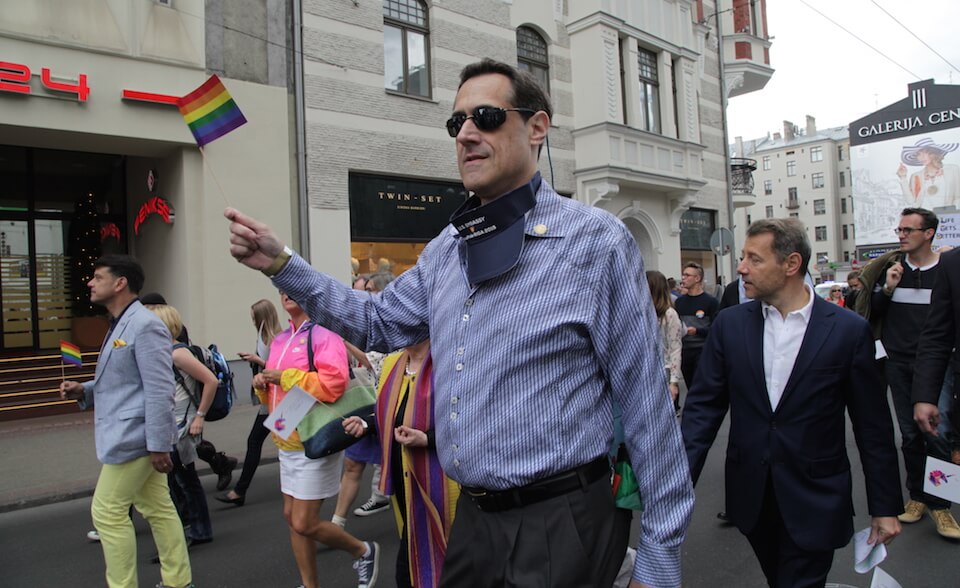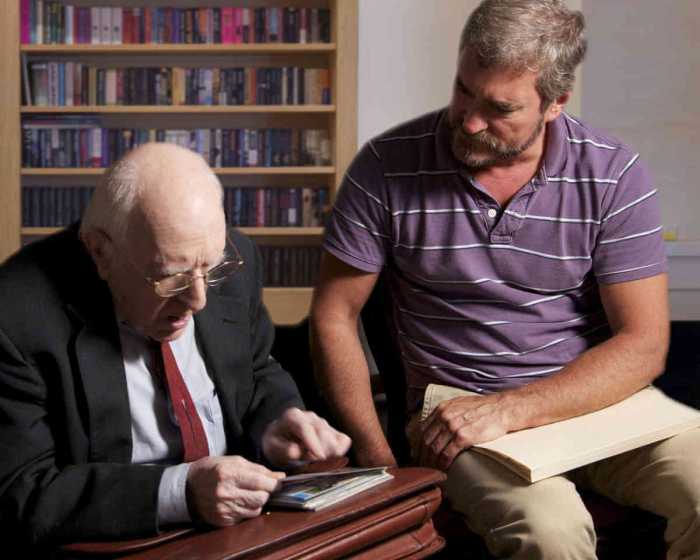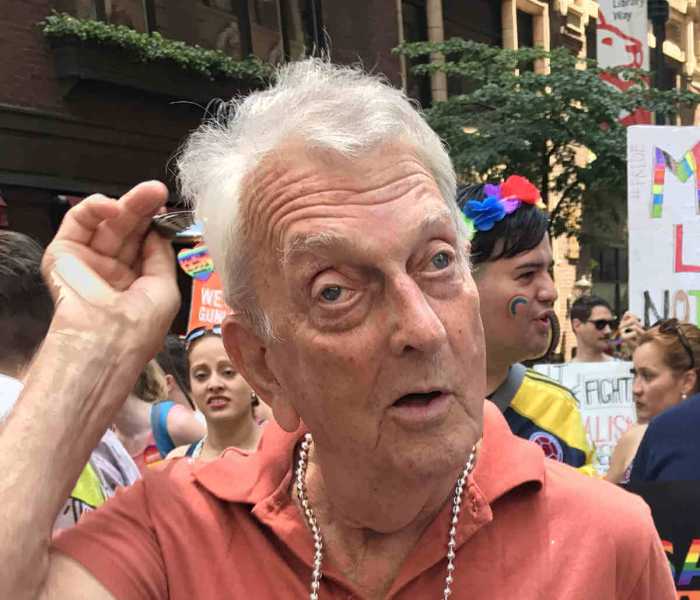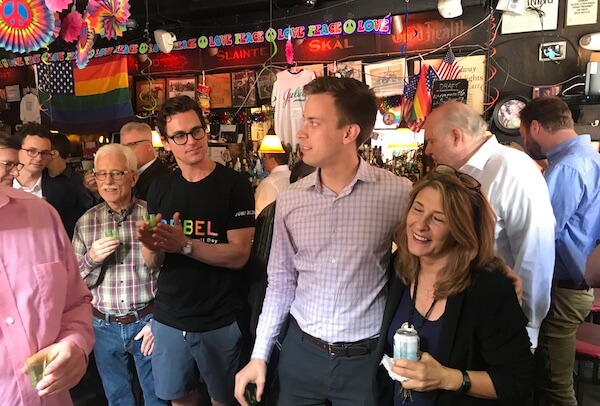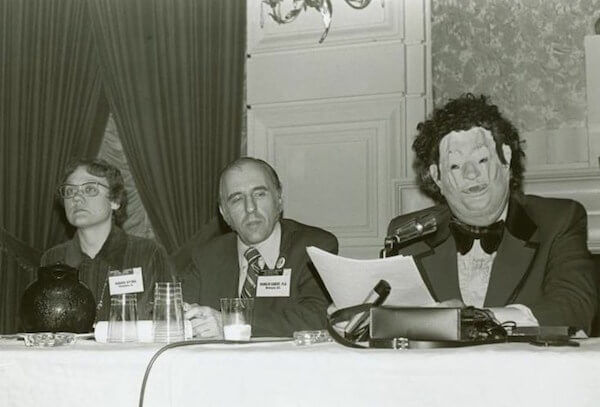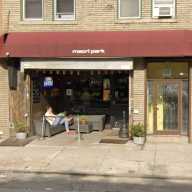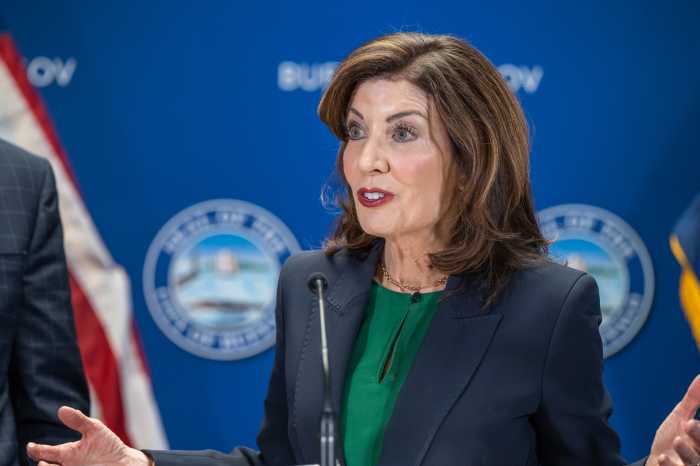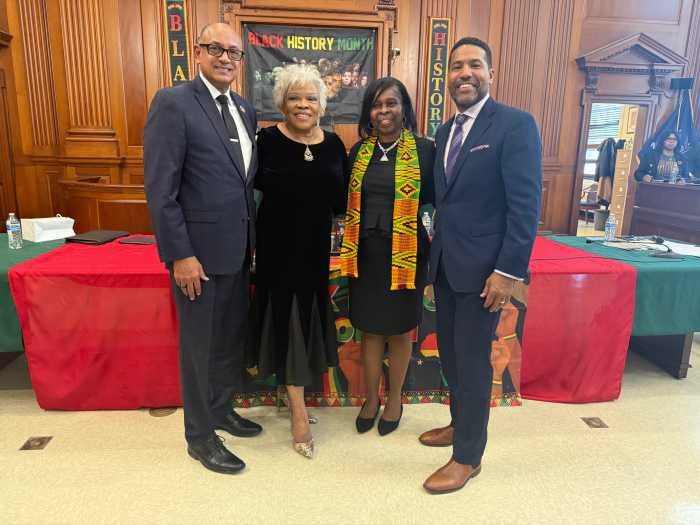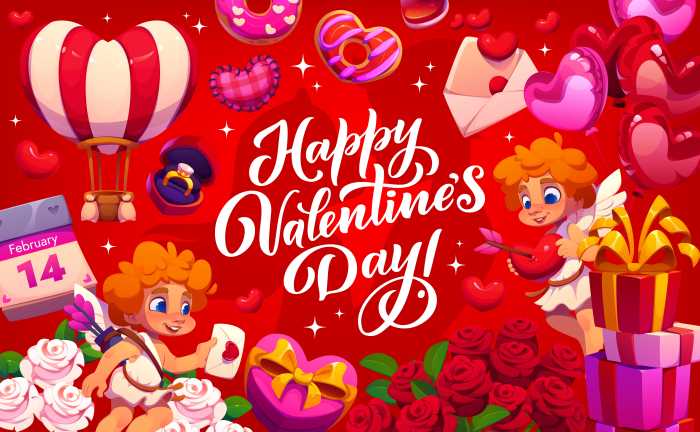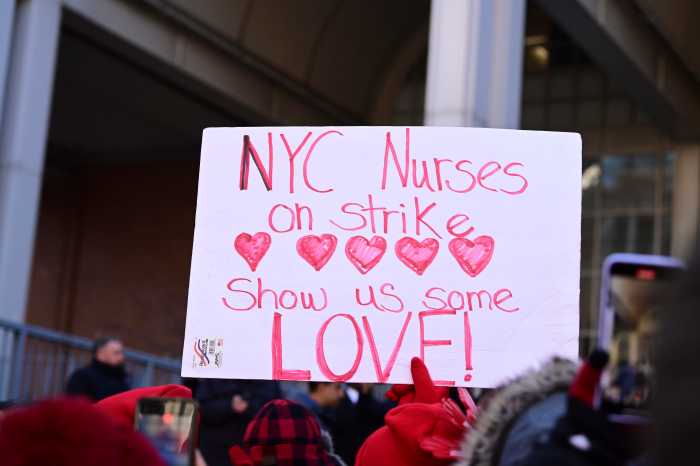Stuart Milk marching in Europepride 2015 in Riga, Latvia. | MICHAEL LUONGO
Among the high-profile international figures who headlined the rally and other events at this past weekend’s Europride in Riga, Latvia, was Stuart Milk, the nephew of assassinated LGBT activist Harvey Milk, a San Francisco city supervisor gunned down in 1978. The younger Milk, born in 1960, now works to maintain and build on his uncle’s legacy; in 2009 Stuart, in tandem with Anne Kronenberg — who worked hand in glove with Harvey in his political efforts — established the Harvey Milk Foundation.
In Riga, Stuart Milk spoke with Gay City News about his uncle and the future of LGBT activism.
In Latvia for Europride, Stuart Milk argues there’s no turning off the lights on the LGBT movement
MICHAEL LUONGO: What do you remember most about your uncle before he was assassinated?
STUART MILK: My relationship with my uncle began in earnest in 1972, when he was co-producing with Tom O'Horgan “Jesus Christ Superstar” on Broadway. He brought me for one of the previews. We had this discussion after the performance. He said, “Who do you want to meet? And do you want to meet Jesus Christ?” You have to realize I came from a Jewish family, so it was kind of odd that we’re even having that discussion. But I said I wanted to meet King Herod, and he said why? And I said because he’s wearing lady’s shoes. And he kind of looked at me funny. And then he began this whole discussion with me, it was really like a light clicked on in him.
He did eventually tell his friends in San Francisco, including the co-founder of the Milk Foundation, his campaign manager Anne Kronenberg, that I was gay. He never, ever brought that up with me. He just brought up that my differences were important. I was 12 when we had the first conversation. He gave me this book called “Seven Arrows,” a Native American anthology, asking me to read the story of Jumping Mouse, a mouse that was different from other mice, something like a 15,000 year-old-story. He wrote in the book, “You and all your differences is the medicine that will heal the world even when the world doesn’t recognize that.” So it really gave me my compass.
I began a relationship with my uncle that was probably more important to me than with my father. I’ll tell you something that I don’t talk about that often: it caused a lot of friction between my father and my uncle. So even though my uncle was supported by my parents and my father for his gay activism, the fact that I had this close relationship really was worrisome to my parents. You have to think of the time, the early ‘70s, and so even though they were supportive of him, they were supportive in that context of that time, which is they’re not going to go out and carry banners with him.
Most of my conversations with my uncle were about my feeling different from everyone else and how important that was and kind of the way of the world. And he would talk to me for hours about that. When he started campaigning, he’d say, “I went to an event where a thousand people hated me, and when I left, 998 people hated me.” And I remember getting that from him and calling him and saying, “Why are you so happy about 998 people hating you?” He said, “Because two didn’t, and those two will become four.”
He loved having those conversations with me. I would challenge him, too. I would even say to my uncle, at my grandfather’s funeral, at his father’s funeral, I said to him, “I don’t think you should be as out and loud as you are.” So typical of my uncle, this would be a conversation with Harvey. “Oh, I agree with you.” And he would do this hand signal, like let’s take that off the table. And then he would spend the next two hours telling me why it was important for him to be loud and out, and convince me.
He did that even in public debates on Proposition 6, the Briggs Initiative, which would have stopped gay people from working in California schools. John Briggs would say something about well, education is, the educational system brings out morality in students. And my uncle would say, “Yeah, I agree with you. And this is why we need to have gay teachers.” It was his style. He was really very charismatic in conversation, and he enjoyed having a conversation with meaning and depth.
ML: Did having Harvey as your uncle make it easier to come out?
SM: In some ways it made it harder. Well, coming out, not necessarily to the family, when he was killed, I came out to everybody. That’s when I found out he knew I was gay. I don’t know why I thought he didn’t know. In 1979, I started doing LGBT activism and even worked with Frank Kameny briefly. Frank asked me to speak at the 1979 DC Pride event, which had like 200 people. Ella Fitzgerald, this drag queen, was our biggest personality we had there. But my first time speaking as an openly gay relative of Harvey, he said, and I love Frank, but he was not good with kids. I was 18 then. And he said, “You’re no Harvey.” I wasn’t a good speaker. I thought the comparisons were always there. Then when I got involved nationally, and then I do get some compliments. Anne Kronenberg was his campaign manager, when we talk within five or ten minutes, she’s calling me Harvey instead of Stuart. So if somebody, even people that don’t know me and know the story and they’ll get confused and they’ll say, “Harvey Milk?” To me, that’s like being a Kennedy and being called Robert Kennedy or John Kennedy. I have no problems with it. Coming out, having a famous uncle, in New York in the 1970s in high school, in middle school and high school, the cover of the New York Times would be “Avowed homosexual runs again.” Not gay activist, but avowed or admitted homosexual running again. Luckily I was big, so I didn’t get physically picked on.
ML: The Harvey Milk Foundation is rather new, established in 2009. What was the process of creating it and why did it take so long?
SM: Anne began the process of starting independently, without working with me at all, soon after my uncle was killed. And she’s not a good fundraiser; they were never successful. I had been doing, in my public and private sector work, a lot of global travel. The LGBT work made sense when I was traveling globally. At the Presidential Medal of Freedom ceremony at the White House, I’m alone with Tito Rivera and Desmond Tutu and Sandra Day O’Connor and Nancy Brinker, all these amazing people. Desmond Tutu turned to Cara Kennedy, who was accepting the award on behalf of her father, Ted, who was alive but too sick to come, and he complimented her on the work she does for the Robert Kennedy Foundation and the John F. Kennedy Foundation. Then he turned to me and says, “What do you do about your uncle’s legacy?” I said, “Well, I always speak at events, I’m openly gay.” And he says, “Oh yeah, I know all that.” He says, with these little spectacles, pointing his finger at me, “You have to do more, because he’s a martyr, and martyrs make a difference all over the world, and he can free people not just in the US but his story can free people globally.” With a Nobel Peace Prize winner pointing his finger at us, Anne and I decided at that point that we would form the Milk Foundation and have a much more global focus. Tutu is on our advisory board, as is Nancy Brinker and Cara Kennedy before she died.
ML: What were your thoughts when your uncle was put onto a US postage stamp?
SM: It was the fruition of a lot of hard work. I thought again of his story being told and the impact of it. My uncle, I don’t think, would have ever cared about whether he was on a postage stamp or there would be a holiday or a children’s book. What he did care about was that people, in particular gay youth, were no longer forced to lie. That they didn’t have to go through what he went through as a young person, and that everyone that he knew that was gay had to go through. I think the postage stamp, he would feel good that it at least gives people hope, and it spreads hope, that little corner of an envelope, and hopefully people read the little bio of him that comes with the sheet of postage stamps.
ML: You travel around the country a lot in your role. What has struck you most in the United States, and globally?
SM: The number one thing in the US for me is what marriage equality has done for visibility. It goes to the very heart of those who were always against the LGBT community, which is that LGBT aren’t family, they’re not God-fearing, and they’re not geared toward whatever it is to be a wholesome life. It really hits at the heart of the arguments against the LGBT community. It destroys all the myths and all the lies and all the innuendoes. Even people who are not fans of those in LGBT marriages are being invited to marriage ceremonies, and it’s a celebration, and they drink a couple glasses of champagne, and they say “Oh, what’s the big deal?” We still don’t have national protection from employment and housing discrimination. But we will have at the end of this month gay marriage everywhere in the US, and it’s a game changer.
The world, on the other hand, I think this is part of the struggle. You’ve got a neighboring country Russia, where for political expediency and for their own cheap political agenda they’re attacking LGBT people. Even Putin’s comment, “I have nothing against LGBT people. Leave the children alone” — that goes to the heart, it’s like Anita Bryant all over again. We’ve got a huge, massive population, 60 percent of the world east of Istanbul. It’s very dark there and not just for LGBT people, but for women, for people of a different religion, for people of a different ethnic background. And so, we have a lot of work globally to do, and it’s kind of like what I said in my speech at the Freedom Conference here in Riga for Europride, meeting [indigenous Australian artist, activist, and academic] Lila Watson in 1985 was really important for me to realize that all of our liberation is bound together. We really are never free if there’s people suffering around the world. We’ve come more than two steps, we’ve come three steps ahead in the US, but we have places in the world where we’re going two steps backwards.
ML: We’re here in Latvia where in the past, there have been attacks on the Pride Parade. Knowing what happened to your uncle, what do you say to activists who put their lives on the line in the struggle for equality
SM: I would say the same thing I said to the crowd two years ago, which is that you can throw eggs at me, you can send bullets to my uncle, you can stop the messenger. But the message of equality, LGBT inclusive equality, will never be stopped. And you can’t stop it by violence, you can’t stop it by eggs, you can’t stop it by bullets. We will move ahead.
ML: What do you think of the progress in the United States on same-sex marriage and transgender issues with Caitlyn Jenner?
SM: It’s really interesting, the transgender issue. It doesn’t get talked about that much. So there are two sides to the transgender coin. So what we have found, we meaning [non-government organizations], but also me personally, around the world is that our female-to-male transgender community has usually a greater level of acceptance and inclusion than male-to-female. Which I think also points to the struggle of women still in society, and it’s seen as less. So for instance, our transgender community that is female-to-male, they usually have greater success in jobs, in society in general. And to me, that points to the fact that we still have to work as a community, as an LGBT community, to connect with the women’s movement and make sure we keep that connection open.
ML: What kind of a world do you want your own nieces and nephews to live in?
SM: I’ve got three. Two of them have taken part in Harvey Milk Foundation events. So they’re straight but they’re very, very comfortable around LGBT. They’re very comfortable in their own skin. They’ll go to gay bars, they’ll go to gay events. They’ll hug and kiss people of the same sex. But my hope is that we get to a world where we do not allow any people to be diminished, either verbally or in reality or by societal values.
It goes back to that Thomas Jefferson saying about what is the price of justice and equality. It’s vigilance. I believe that we have to remain vigilant. I don’t believe that there’s ever a day where you turn out the lights on the LGBT rights movement. We’re going to have gay kids coming up in some community, in some societal value that tells them to hide who they are because again, it’s a small percentage of, it’s a minority. We’re what, three or four percent of the population? So they’re going to have to struggle with role models even if we have 12 Ellen DeGenereses on TV. They still are going to struggle, because in their own circle, they’re going to struggle with relating. I think we’ve got to remember that the price of equality is vigilance, as Thomas Jefferson said, the price of equality and justice is vigilance.

